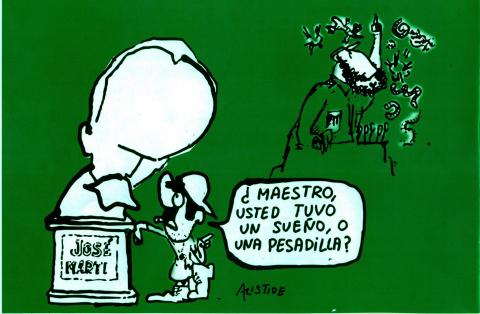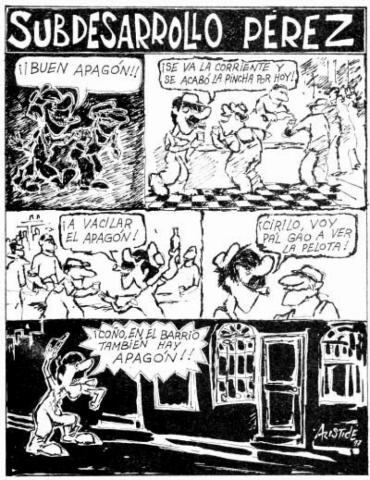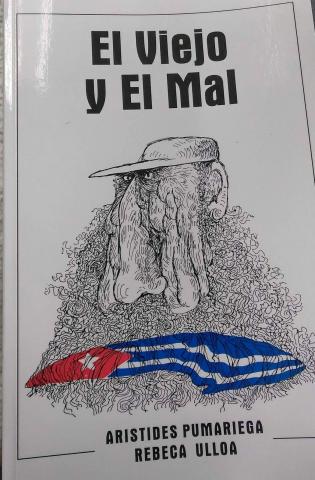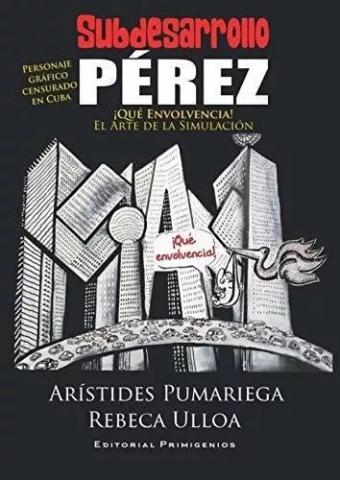A este conocido humorista gráfico lo seguía en la publicación humorística cubana Palante. Me gustaban mucho sus personajes. Algunos de ellos me sorprendían, porque encontraba en segundas lecturas una disidencia que no sé cómo el oficialismo no se daba cuenta.
No tuve la oportunidad de conocerlo personalmente, pero varios artistas contemporáneos de él me comentaban anécdotas sobre su personalidad, su historia y cómo pensaba. Por supuesto, como es la vida en general, me contaban con cosas buenas, malas y regulares. Por eso siempre quise conocerlo, porque sin importar si coincidía o no con sus pensamientos y conducta, intuía que era (y es) un personaje muy interesante.
Después, ya viviendo en Chile, pude disfrutar un par de sus libros publicados también en el extranjero.
Y ahora tengo el placer y el honor de tenerlo aquí, mediante su esposa y representante.
Algunos datos sobre él:
Se graduó de periodista en 1959. Fue director artístico del Semanario Palante y de la Revista Opina. Creó personajes como El Popiao y Subdesarrollo Pérez. Fue reconocido por el Centro Italiano del Humor Fumetto como uno de los 100 caricaturistas más importantes. Ha recibido numerosos premios nacionales e internacionales.
(Este vis a vis lo realizamos en 2016).
PP: Hola, Aristide. Para comenzar, ¿te gusta que te hagan entrevistas?
ARÍSTIDE: Sí, por supuesto…yo digo que soy como un perro que en el camino me puedo encontrar con un lodazal, me mancho de lodo, pero como buen perro, me sacudo y sigo andando.
PP: ¿Cómo ves el estado del humor en el país donde vives ahora, en televisión, radio, teatro, literatura y gráfica este año?
ARÍSTIDE: El humor bueno, siempre es escaso. En mi caso, trato de pensar para que sea bueno. No me detengo a ver qué está pasando a mi alrededor, me ocupo siempre de hacer lo mejor.
PP: Buena estrategia. Arístide, en varios países de América Latina se dice: "Mi país es un pueblo de humoristas", "En mi país, tú mueves una piedra y sale un humorista", etc. ¿En el país donde vives se dice lo mismo?
ARÍSTIDE: En mi país de origen, Cuba, decían eso mismo. Pero he vivido en tantos lugares que ya no sé bien ni donde vivo.
PP: Para ti, ¿es verdad la acuñada frase: "Es más fácil hacer llorar que hacer reír?
ARÍSTIDE: La verdad que hay gente que se ríe tanto que termina llorando.
PP: Es cierto. Y quizás haya gente que llora tanto que termina riendo… ¿Cuándo decidiste hacerte humorista?
ARÍSTIDE: Yo no…. Lo decidió la vida.
PP: Tuviste una vida muy decidida entonces. Bien por ti. Pero dime una cosa, según tu criterio, ¿el humorista nace o se hace?
ARÍSTIDE: Ni se hace ni nace. Simplemente existe.
PP: ¿Arístide o Aristotele (sin “s” al final como tu nombre)?, ja, ja. Estimado, ¿cuál ha sido el mejor y el peor momento de su carrera hasta el día de hoy?
ARÍSTIDE: El mejor: el día que publiqué mi primera caricatura. El peor será cuando publique la última.
PP: Bueno, ojalá que siempre sea la penúltima, para que pensemos que siempre habrá otra... Como profesional del humor, ¿te ríes fácil? ¿Con qué tipo de chistes?
ARÍSTIDE: A veces me río con el chiste más tonto… sí, me río fácil.
PP: ¿Puedes contarme alguna anécdota relacionada con tu profesión?
ARÍSTIDE: Bueno, "Subdesarrollo Pérez", el personaje que me dio la fama en Cuba, lo descubrí un día hablando con mi tío, que era tremendo descarado y me dijo que estaba muy orgulloso, porque le habían dado el carnet del Partido Comunista de Cuba. Mi personaje nació ese día y fue tan oportunista como mi tío.
PP: Inolvidable personaje. Arístide, ¿con cuáles colegas te identificas más?
ARÍSTIDE: Para mí el más grande de todos los tiempos del humor es el Charlot de Charles Chaplin.
PP: Perfecto. Y para ir cerrando, ¿qué me aconsejarías a mí como humorista?
ARÍSTIDE: Pensar, pensar y volver a pensar.
PP: Mil gracias, Arístide, por tu tiempo y dedicación para lograr este vis a vis.
Te deseo mucha salud, suerte y éxitos.




Interview with Arístide Pumariega
by Pepe Pelayo
I used to follow this well-known cartoonist in the Cuban humor magazine Palante. I really liked his characters. Some of them surprised me because, upon second readings, I found a kind of dissent that I’m not sure how the authorities didn’t notice.
I never had the chance to meet him in person, but several of his contemporary artists shared anecdotes about his personality, history, and way of thinking. Of course, as is the case with life in general, they told me good, bad, and average things about him. That’s why I always wanted to meet him—because regardless of whether I agreed with his thoughts and behavior or not, I sensed he was (and still is) a very interesting figure.
Later, while living in Chile, I got to enjoy a couple of his books that were also published abroad.
And now I have the pleasure and honor of featuring him here, through his wife and representative.
Some details about him:
He graduated as a journalist in 1959. He was the artistic director of the weekly Palante and the magazine Opina. He created characters such as El Popiao and Subdesarrollo Pérez. He was recognized by the Italian Center of Humor Fumetto as one of the 100 most important cartoonists. He has received numerous national and international awards.
(This interview was conducted in 2016).
PP: Hello, Aristide. To start, do you like being interviewed?
ARÍSTIDE: Yes, of course… I always say I’m like a dog. I might come across a muddy puddle on my path, get covered in mud, but like a good dog, I shake it off and keep moving forward.
PP: How do you see the state of humor in the country where you live now—on television, radio, theater, literature, and in graphic arts this year?
ARÍSTIDE: Good humor is always scarce. In my case, I try to think so that it’s good. I don’t focus on what’s happening around me; I always strive to do my best.
PP: A solid strategy. Aristide, in several Latin American countries, people say things like, “My country is a land of humorists,” or, “In my country, if you turn over a rock, a humorist will pop out.” Do people say the same in the country where you live?
ARÍSTIDE: In my home country, Cuba, they used to say the same thing. But I’ve lived in so many places that I’m not even sure where I live anymore.
PP: Do you think there’s truth to the saying, “It’s easier to make people cry than to make them laugh”?
ARÍSTIDE: The truth is, some people laugh so hard that they end up crying.
PP: That’s true. And perhaps some people cry so much that they end up laughing... When did you decide to become a humorist?
ARÍSTIDE: I didn’t. Life decided for me.
PP: Life certainly made some strong decisions for you. Good for you. But tell me, in your opinion, is a humorist born or made?
ARÍSTIDE: Neither. They simply exist.
PP: Aristide or Aristotle (without the “s” at the end, like your name)? Haha. Dear Aristide, what has been the best and worst moment of your career so far?
ARÍSTIDE: The best: the day I published my first cartoon. The worst will be when I publish my last one.
PP: Well, let’s hope it’s always the second-to-last, so we can believe there will always be another one... As a humor professional, do you laugh easily? What kind of jokes make you laugh?
ARÍSTIDE: Sometimes I laugh at the dumbest joke… Yes, I laugh easily.
PP: Can you share an anecdote related to your profession?
ARÍSTIDE: Well, Subdesarrollo Pérez, the character that made me famous in Cuba, was born one day while talking to my uncle. He was incredibly shameless and told me he was very proud because he had been given a membership card for the Cuban Communist Party. My character was born that day and was as opportunistic as my uncle.
PP: An unforgettable character. Aristide, which colleagues do you identify with the most?
ARÍSTIDE: For me, the greatest of all time in humor is Charles Chaplin’s Charlot.
PP: Perfect. And to wrap up, what advice would you give me as a humorist?
ARÍSTIDE: Think, think, and think again.
PP: Thank you so much, Aristide, for your time and dedication to making this interview happen.
I wish you good health, luck, and continued success.
(Some texts have been translated into English by ChatGPT)

